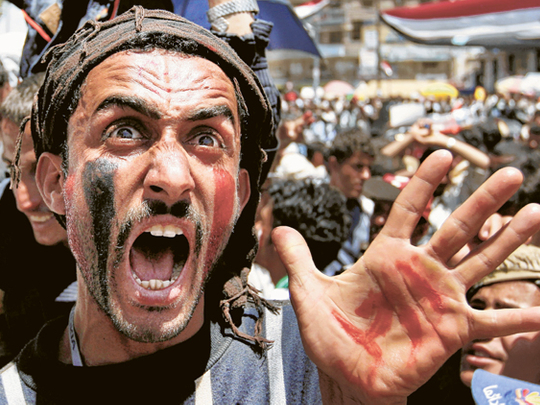
Security breaches by supporters of ousted president Ali Abdullah Saleh in Yemen need to be paid serious and immediate attention by the sponsors of the Gulf Cooperation Council (GCC) initiative and the United Nations.
Playing contentious political games behind the scenes was not enough for Saleh — whose appetite for interference in government affairs remains unsatisfied — now loyalist troops led by his son Brig Gen Ahmad Ali Abdullah Saleh are fighting to bring back the old regime.
An unexpected move by the Republican Guards to take over the Ministry of Defence in mid-August when President Abd Rabbo Mansour Hadi and Defence Minister Ali Nasser Ahmad were away from the country was thwarted at the cost of two lives and other casualties. This is not the first attempt — last month’s fighting among Saleh’s military supporters and government forces at the Ministry of Interior led to 15 deaths.
Such repeated acts of aggression aimed at undermining law and order have further contributed to the chaos prevailing in Yemen. It is surprising that despite continued obstacles to political stability and security put up by Saleh and his supporters, the United Nations has not imposed international sanctions on them for hindering the implementation of the GCC Initiative.
Hadi not taking any firm decision regarding the dismissal of the military leaders supporting the ousted leader, a move strongly recommended by many Yemeni activists, is also a reason for the current situation.
It is absolutely necessary to regain control over all military institutions in order to restore stability. Any further delay might give the wrong signal to Saleh’s supporters, who continue to resist political change, and are using all means to restore the old regime. They would perhaps even support a military coup aimed at reversing the success of the revolution.
Eid Al Fitr was the first since the revolution, and witnessed Saleh insisting on fulfilling his role as in the past, by receiving in his old house many tribal leaders and supporters. What is more disturbing is that the event was broadcast on his privately-owned TV channel.
On the other hand, Hadi and senior officials performed Eid prayers in the Republican Palace’s mosque contrary to expectations that the prayers would be held at the Grand Mosque or Al Saleh Mosque as usual.
The president has faced has been widespread criticism for not praying with the revolutionaries in the Change Square. The decision may have been taken to ensure security not just for Hadi, but for countless others, in view of the recent rise in Al Qaida-led terror attacks all over Yemen.
Nothing achieved
There is a lack of security and stability despite attempts by the transitional government to take control. The pulse of the revolution has begun to fade. The youth behind the revolution seem to have handed over the reins to the government, forgetting that it is their revolution, one which is still a long way from achieving its goals.
My aim is not to incite the young people against the government, but they must make the transitional government feel their presence.
For instance, if the younger revolutionaries gathered to protest in the squares on Friday to remind us of the martyrs who sacrificed their lives to bring down the old regime and achieve the dream of building a modern Yemen, it would serve a useful purpose without disrupting either the government or the people’s interests since it is a holiday.
It will definitely make a difference and keep the pulse of the revolution beating. At the same time it will undermine the shaikhs, military commanders and tyrants whose support for the old regime has resulted in encouraging sedition and disturbing public peace. It would consequently frustrate their objectives arising from vested, myopic interests.
A National Dialogue Conference is scheduled for November-end under the sponsorship of the United Nations, the United States, the European Union and the Gulf Cooperation Council.
Even if the current tense atmosphere is not conducive for holding the conference, it is necessary and must not be postponed. This will be an ideal opportunity for all parties and individuals invited to put their observations and agendas transparently on the dialogue table.
This conference offers a platform for anyone supporting democracy to present his point of view and outline any future plans for the development of Yemen. I sincerely hope that it will not be a place for political parties to engage in another fight over how to bring peace to Yemen.









